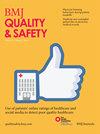Community pharmacy medication review, death and re-admission after hospital discharge: a propensity score-matched cohort study
引用次数: 19
Abstract
Background In-hospital medication review has been linked to improved outcomes after discharge, yet there is little evidence to support the use of community pharmacy-based interventions as part of transitional care. Objective To determine whether receipt of a postdischarge community pharmacy-based medication reconciliation and adherence review is associated with a reduced risk of death or re-admission. Design Propensity score-matched cohort study. Setting Ontario, Canada Participants Patients over age 66 years discharged home from an acute care hospital from 1 April 2007 to 16 September 2016. Exposure MedsCheck, a publicly funded medication reconciliation and adherence review provided by community pharmacists. Main outcome The primary outcome was time to death or re-admission (defined as an emergency department visit or urgent rehospitalisation) up to 30 days. Secondary outcomes were the 30-day count of outpatient physician visits and time to adverse drug event. Results MedsCheck recipients had a lower risk of 30-day death or re-admission (23.4% vs 23.9%, HR 0.97, 95% CI 0.95 to 1.00, p=0.02), driven by a decreased risk of death (1.7% vs 2.1%, HR 0.79, 95% CI 0.73 to 0.86) and rehospitalisation (11.0% vs 11.4%, HR 0.96, 95% 0.93–0.99). In a post hoc sensitivity analysis with pharmacy random effects added to the propensity score model, these results were substantially attenuated. There was no significant difference in 30-day return to the emergency department (22.5% vs 22.8%, HR 0.99, 95% CI 0.96 to 1.01) or adverse drug events (1.5% vs 1.5%, HR 1.03, 95% CI 0.94 to 1.12). MedsCheck recipients had more outpatient visits (mean 2.11 vs 2.09, RR 1.01, 95% CI 1.00 to 1.02, p=0.02). Conclusions and relevance Among older adults, receipt of a community pharmacy-based medication reconciliation and adherence review was associated with a small reduced risk of short-term death or re-admission. Due to the possibility of unmeasured confounding, experimental studies are needed to clarify the relationship between postdischarge community pharmacy-based medication review and patient outcomes.社区药房药物审查、出院后死亡和再次入院:一项倾向评分匹配的队列研究
背景:住院药物审查与出院后预后的改善有关,但很少有证据支持将社区药房干预作为过渡护理的一部分。目的确定出院后接受社区药房药物调节和依从性审查是否与降低死亡或再入院风险相关。设计倾向评分匹配队列研究。加拿大安大略省,参与者2007年4月1日至2016年9月16日从一家急症护理医院出院的66岁以上患者。曝光MedsCheck,由社区药剂师提供的公共资助的药物调节和依从性审查。主要结局:主要结局为死亡或再入院时间(定义为急诊科就诊或紧急再住院)长达30天。次要结果是30天门诊医生就诊次数和药物不良事件发生时间。结果MedsCheck受者30天死亡或再入院的风险较低(23.4% vs 23.9%, HR 0.97, 95% CI 0.95 ~ 1.00, p=0.02),这是由于死亡风险降低(1.7% vs 2.1%, HR 0.79, 95% CI 0.73 ~ 0.86)和再入院风险降低(11.0% vs 11.4%, HR 0.96, 95% 0.93 ~ 0.99)。在倾向评分模型中加入药物随机效应的事后敏感性分析中,这些结果被大大削弱了。30天内急诊科复诊率(22.5% vs 22.8%, HR 0.99, 95% CI 0.96 ~ 1.01)或药物不良事件(1.5% vs 1.5%, HR 1.03, 95% CI 0.94 ~ 1.12)无显著差异。MedsCheck接受者有更多的门诊就诊(平均2.11 vs 2.09, RR 1.01, 95% CI 1.00 ~ 1.02, p=0.02)。在老年人中,接受以社区药房为基础的药物调节和依从性评估与短期死亡或再入院风险的小幅降低有关。由于可能存在无法测量的混杂因素,需要进行实验研究来阐明出院后社区药房药物评价与患者预后之间的关系。
本文章由计算机程序翻译,如有差异,请以英文原文为准。
求助全文
约1分钟内获得全文
求助全文

 求助内容:
求助内容: 应助结果提醒方式:
应助结果提醒方式:


